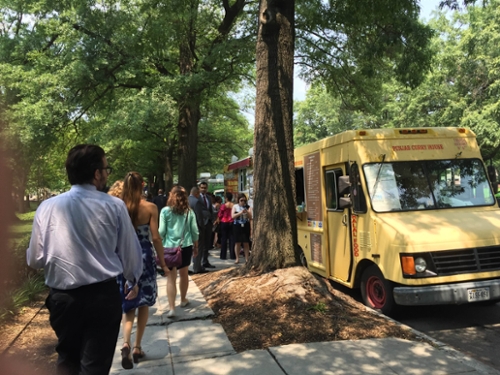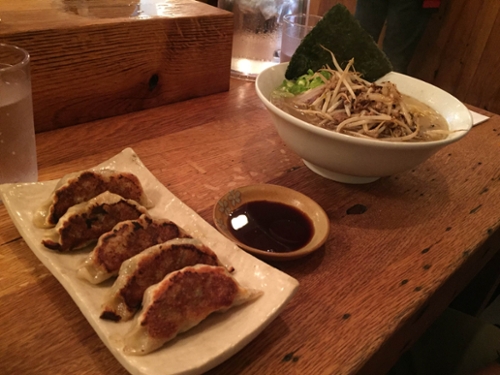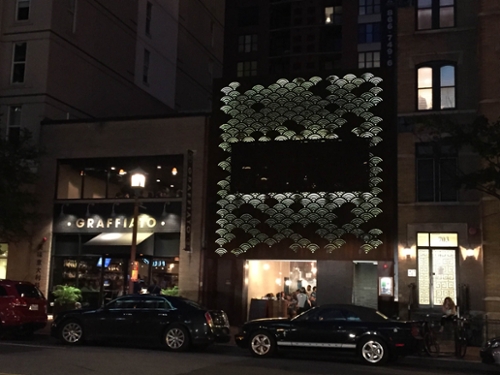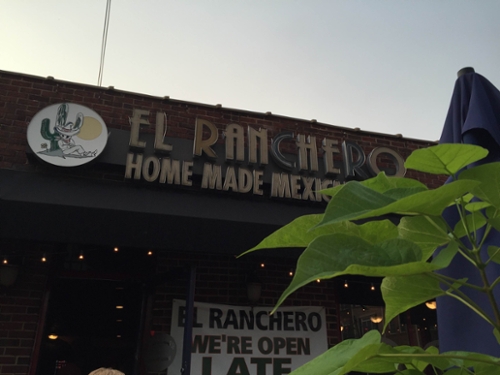Big Changes and Big Ideas

Despite a markedly short week (we let out at 3:00 p.m. on Thursday for the 4th of July holiday), it was quite an eventful few days at USIP.
Workwise, I have been digging deeper into my research on the freedom of information (FOI) as a tool to combat corruption. I am compiling my information into memo-format, which we will give to the Afghanistan senior program officer when he gets back in the office in the next few weeks. I discussed the project with my supervisor a few days ago - she hopes to use my research for not only a webinar for rule of law practitioners, but also for an accompanying publication. As a young professional, I am thrilled at the prospect of my work being used to support USIP programming, especially in such a dynamic, crucial area. Now that I have explored major themes regarding FOI as an anti-corruption tool, I can also tailor my research to a more Afghanistan-specific context, which excites me as well.
I find myself at USIP at a very interesting time in its history. Not only is it USIP's 30-year anniversary as an institute, but it is also undergoing major structural changes that present USIP staffers with both huge questions as well as huge opportunities. USIP president Nancy Lindborg convened a staff-wide town hall, a "state of the institute address" of sorts as one of my colleagues described it. This gave USIP leadership the chance to discuss some of the major changes that will be occurring within the next few years as well as provided the opportunity for USIP staff to ask questions. I was impressed with the lengths to which the USIP leadership went to show that they had taken USIP staff feedback seriously. Some of the "ways forward" are minor such helping USIP staff get to know each other by hosting a talent show in August. Others were major, such as the promotion of one of USIP's own to the executive vice president position and the creation of a new Asia Center.
I am on the Rule of Law team, which is housed under the Center for Governance, Law, and Society (GLAS). GLAS itself combines several thematic areas such as relgion, gender, and rule of law under one umbrella within the USIP structure. One major announcement at the town hall was that GLAS, which is programmatic in nature, will be further combined with USIP research and training components moving forward. While this is an exciting prospect that has great potential to maximize USIP's impact in working towards sustainable peace, there are many unknowns. Fortunately, since USIP is conveniently full of peacebuilders and has incredible internal capacity, USIP staff has mobilized to help come up with creative solutions to potential transitional problems and identify areas that USIP can use to its greatest advantage in the months to come. Part of this process was GLAS hosting an Ideas Cafe.
I attended the GLAS Ideas Cafe on Thursday, which was truly a professional first for me. The GLAS team split into groups to come up with opportunities, challenges, and solutions to different aspects of the structural changes. After twenty minute discussion on each topic, we would switch to talk about different issues with different people at different tables. This allowed for many perspectives to be heard and represented - from academics to grant writers to practitioners to administrative staff to those who have been at USIP for years to those of us who have only been here a few weeks. At the end of the session, we all convened to talk about major themes that emerged, that have since been typed up and will be sent to USIP leadership at some point in the near future. Although I did not contribute much to the discussion since I know so little about USIP's structure and functioning compared with my colleagues, I appreciated learning a new way to foster inclusive feedback, and I feel it will benefit me greatly in the years to come.
After the GLAS Ideas Cafe, I was able to introduce myself to Colette Rausch, which was exciting because I was able to help draft a college-level study guide to her book earlier this year with Professor Warren and Meghan Phillips, another William & Mary student. Colette's book is called "Speaking Their Peace: Personal Stories from the Frontlines of War and Peace," and is composed of interviews she's collected from post-conflict zones around the world. Her book was fascinating, so it was great to talk about it with her. The book was launched a few months ago at USIP, which you can read more about here. Also, the study guide that Professor Warren, Meghan, and I drafted can be found here.
The final exciting event I was able to attend before the 4th of July weekend was a brownbag with with Maya Soetoro-Ng, who works at Matsunaga Institute for Peace and Conflict Resolution in Hawaii, is currently a visiting scholar here at USIP, and happens to be President Obama's sister. The brownbag was casual and fun. Everyone in the room went around to tell Maya a fact about ourselves that no one else in the room knew, which yielded some interesting information. It turns out I work with a distant relative to Celine Dion as well as a former U.S.'s fast-walking champion. Maya then told us about her travels as well as her career in peacebuilding. She ended with some hilarious wisdom from Tina Fey. I enjoyed getting to know about an accomplished peace scholar in such a laid-back atmosphere. It was a great way to cap off such a full week.
Outside of work, I enjoyed meeting up with my William & Mary travel partner from my Kosovo internship last summer in Dupont Circle...

...enjoying the array of food trucks in D.C. during the lunch hour...

...exploring Chinatown...


...and hoping over to Arlington for homemade Mexican food...

An eventful, tasty week to say the least.